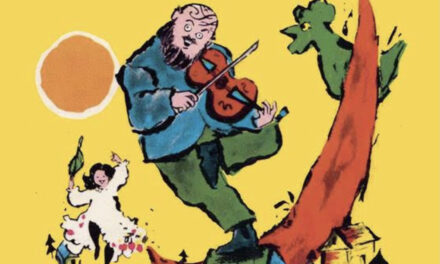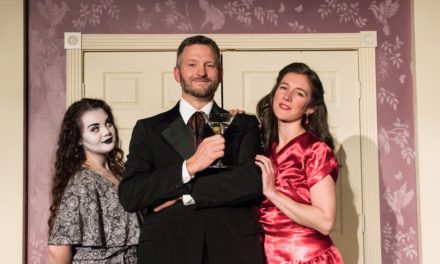By Daniel Buckwalter
You are the court jester. You work for the Duke of Mantua. You have mocked the husbands of the Duke’s many sexual conquests as well as Monterone, a statesman whose gorgeous underage daughter has been seduced. You are feared and you are despised.
How far can you go before the slings and arrows you hurl turn to anger and curses turned toward you, before the anxiety and innuendo you have fostered are channeled into frothing revenge, and damn if facts get in the way?
Welcome to Giuseppe Verdi’s beloved opera Rigoletto, a three-act production by Eugene Opera that opened Friday night before an appreciative audience at the Hult Center’s Silva Concert Hall. It will be performed again on Sunday, Feb. 2, with a matinee at 2:30 p.m. It is well worth the effort to see and absorb.
This being opera, try not to get too caught up in the story. Rigoletto — the hunchback character played by Grant Youngblood, and the opera itself — is a mosh pit of greedy and self-indulgent characters who spread rumors and lies, who carry smoldering, deep-seated resentments, and who plot vengeance at every turn.
It’s a tangled web that can confuse almost anyone. Just know that there are misunderstandings everywhere and that there is a murder at the end.
Instead, focus on the glorious music from Verdi’s pen as well as first-rate acting. There’s Rigoletto’s daughter Gilda (the wonderful soprano Véronique Filloux), as well as the stirring voices of the Duke (Bernard Holcomb), Sparafucile (Ben Brady), Maddalena (Erika Rauer), Monterone (Doremus Scudder), and Borsa (Esteban Zúñiga Calderón), among others.
There are the familiar arias, Caro nome in Act 1 as well as La donna è mobile in Act 3, and Act 2 has an achingly beautiful work sung by Rigoletto and Gilda. The music is magnificent.
There was a small lighting glitch near the end of Act 1 in Friday night’s performance. I took the darkened stage at that moment as part of the dark scene of the opera, but Andrew Bisantz, Eugene Opera’s artistic director and conductor, immediately saw a problem and momentarily halted the production.
Bisantz handled it with professional aplomb (he probably has seen worse), quietly and immediately instructing the cast and orchestra where to pick up the story when the problem was resolved. It took less than a minute for the lighting glitch to be fixed, and that tiny snafu got me off the story enough to appreciate the set design of Rigoletto.
Eugene Opera’s production of Rigoletto is set in the 1930s with an Art Deco aesthetic, the joint vision of Jefferson Ridenour of the Colorado-based Papermoon Opera Productions and Abby Dunn, technical director of Eugene Opera.
It is a sparse and evocative design, accenting shadows that the characters, infested with their multi- layered ulterior motives, make great use of. Indeed, the opening of Act 3 has a film noir element to it that makes the fatal stabbing of Gilda all the more tragic.
Eugene Opera’s Rigoletto is both a visual and auditory delight. Be sure to see the final production Sunday at 2:30 p.m. at Hult Center’s SIlva Concert Hall.











